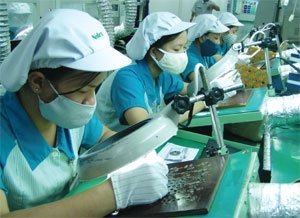
The Ministry of Industry and Trade’s (MoIT) drafted strategy, with a focus on attracting investment from small- and medium-sized (SMEs) foreign companies, has been sent to provincial and ministerial bodies for comment and outlines Vietnam’s call for investment from key markets such as Japan, Taiwan, Korea and South East Asia.
“Investment promotion will give priority to SMEs in these markets. At the same time, we will develop industrial clusters for supporting industries with associated incentives for infrastructure and services,” the MoIT said in a report.
It added that big foreign companies’ investment in the past had failed to help Vietnam develop supporting industries, because capital was focused on assembling facilities to take advantage of cheap labour.
To make Vietnam more attractive to foreign SMEs, the MoIT proposed the government adjust regulations on import and export taxes that would give supporting industry investors more incentives, but only if they built a supporting industry facilities and used local market input materials.
Particularly, the strategy demands reform of Decree 87/2010/ND-CP issued in 2010 detailing import and export duty regulations, with supporting industry firms to be eligible for five-year import duty exemption.
The strategy is part of the government’s push to make Vietnam an industrialised nation by 2020.
While Vietnam’s economy has rapidly grown in recent years, analysts claim its industry still has considerable supporting industry weaknesses which had turned off foreign investors.
Statistics of the MoIT’s Industry Policy Study Institute show that Vietnam had just 364 enterprises operating in supporting industries, of which 56 were foreign-invested enterprises, or 16 per cent of the total.
While Vietnam has attracted multinational companies like Intel and Foxconn, these suppliers mostly imported components and input materials from overseas and exported products. Consequently, these enterprises do not transfer technology to domestic firms.
Apart from changing investment promotion with a revised incentive policy, the country will develop a series of industrial parks for supporting industries like Japan has. The parks will include manufacturing facilities, completed water and electricity supplies and waste treatment.
In related news, the Ministry of Planning and Investment’s Foreign Investment Agency (FIA) last week signed a memorandum of understanding with Tokyo-based Forval Corporation to promote direct investment of Japanese SMEs in Vietnam.
Under this memorandum of understanding, the two sides will regularly exchange information and opinions concerning the effective methods of promoting attractive investment environment of Vietnam in Japan. Moreover, FIA and Forval will conduct activities for investment support to Japanese SMEs when they wish to penetrate Vietnam.
VIR